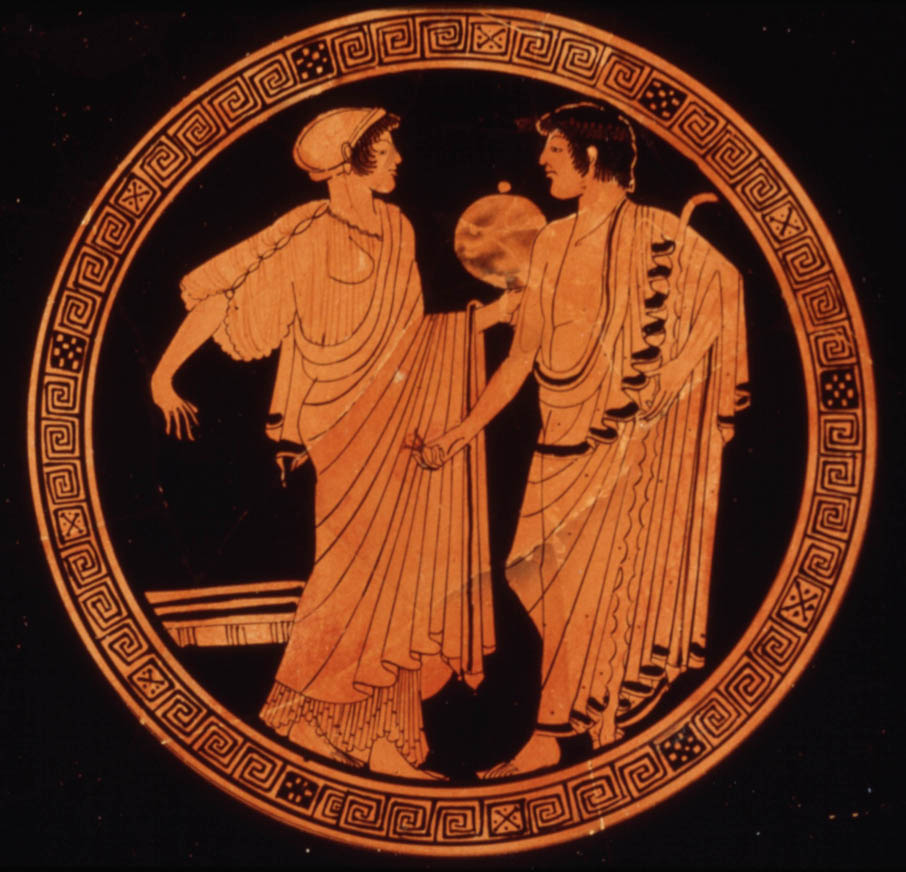Translated by Steven J. Willett

This 5th-century red-figure cup image shows a client trying to bribe a courtesan with a bag of coins while she stands back a little doubtful while gazing at her beauty in a mirror.
Note: In the elegies of Book II, Delia has abandoned Tibullus and he’s abandoned any hope of a family farming life on his estate. He’s now in passionate love with a courtesan or hetaera (ἑταίρα, “companion”, pl. ἑταῖραι; Latin hetaera, pl. hetaerae). The high-class hetaerae were expected to read and write as well as master the arts of singing, dancing and lyre playing while providing a sexual relationship with a wealthy man who could pay their fees. They were also permitted to attend a symposium, an all male discussion party. Tibullus has fallen in agonizing love with a hetaera named Nemesis, who ranks sufficiently high that she expects quite serious gifts. He’s infuriated that nothing he tries will move her to any stable relationship. It’s clear that Nemesis is punishing him for something, but only in the course of the poem does it appear that she’s unsatisfied because he can’t meet her pretium. This gives Elegy II.4 a sharp, genuine expression of pain unlike anything else in his poetry. The emotional outbursts against her are harshly vivid and lack any parallel in all the elegiac poets. They also lead to extremely complex syntax and sudden, unexpected contrasts.
So then, I see slavery and mistress planned for me: for me now, freedom of my birthright, farewell. I’m inflicted with slavery, repulsive, clasped in chains, and never, to my grief, Love slackens bonds, and if I earned it or haven’t sinned at all, he burns me I burn: oh remove, ferocious girl, the torch. O that I not be able to feel again such torment, I’d prefer on icy peaks to be a stone, a shaggy cliff that stands exposed to ferocious winds, pounded by forlorn sea’s shipwrecking waves. Now day is bitter and more bitter shadows of the night; for every moment drips with dismal gall. Neither elegies nor Apollo, patron of song, proffer help: she cups a hand demanding always price. Keep far away, Muses, if you can’t benefit a lover: I won’t tend you if wars need me to sing, nor do I track the Sun’s path nor her state where Moon ends orbit, and turns the steeds to gallop back. I search through songs for easy access to a mistress: go far off, Muses, if those are powerless. But for me bloodshed and crime must provide her gifts, and I don’t lie in tears by her shut house. Or I may seize the offerings hung in sacred temples: but Venus will be outraged first by me. She urges me to vicious crime and a rapacious mistress gives me: she feels the temple-robbing hands. O let whoever gathers green-bright emeralds pass away and dips the snow-white sheep in Tyrian dye. This one gives cause for greed and Coan silk for girls clothing and lucent pearls from the Red Sea.
